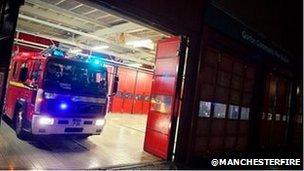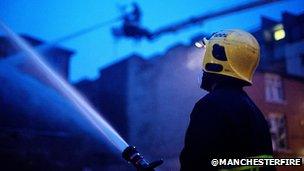Firefighters confirm four-hour strike in England and Wales
- Published

The strike will take place between noon and 16:00
Firefighters in England and Wales will go on strike on 25 September in a row over pensions, the Fire Brigades Union (FBU) has confirmed.
FBU general secretary Matt Wrack said the four-hour strike is "a warning shot to government".
Firefighters in Scotland will not strike on 25 September, but could still take industrial action later, the union said.
The government called the decision to strike "unnecessary and avoidable".
It called its offer to release full pensions to firefighters when they reach the age of 60 "generous".
But Mr Wrack said: "This initial strike is a warning shot to government. Firefighters could not be more serious about protecting public safety and ensuring fair pensions.
'Lives endangered' claim
"Governments in Westminster and Cardiff have simply refused to see sense on these issues.
"It is ludicrous to expect firefighters to fight fires and rescue families in their late 50s - the lives of the general public and firefighters themselves will be endangered."
The FBU had previously said the current proposals would see firefighters who retire or are forced out of work at 55 losing about 50% of their pensions.

Around 85% of firefighters in England and Wales are union members
The FBU says around 85% of firefighters in England and Wales are union members. Of those who voted in England, Wales and Scotland, 78% were in favour of strike action.
The walkout will take place for four hours, between noon and 16:00BST.
During the action, each of the 46 fire and rescue authorities in England have a legal duty to put contingency plans in place.
The government said the plans in place were "robust".
The Welsh government said it was working with the three fire and rescue authorities there as well as the UK Government on contingency plans to minimise the impact of the strike.
Armed personnel support
Unlike the strikes of 2002 and 2003, in England trained armed forces personnel will only be brought in to help if there is a major incident. But they may be more involved in the running of the service in Wales.
The ageing Green Goddess fire engines used in 2002 and 2003, though, were sold off in 2005-06 (800 of them) to different organisations and individuals by the Disposal Services Authority, the Ministry of Defence said.
Should a "major incident" occur, the FBU has agreed it will exempt firefighters and operation managers from strike action if they volunteer to help.
The FBU said that firefighters in Scotland will not strike next week while union officials are discussing the Scottish Government's most recent proposals.
The union said government figures showed that thousands of firefighters could face the sack without access to a proper pension because they are getting older.
It said a recent government review found that more than half of current firefighters between the ages of 50 and 54 are no longer able to meet fire and rescue service fitness standards for fighting fires, while two thirds of those beyond the age of 55 fail to meet the standards.
The union said the majority of firefighters pay 13% of their salary to pension contributions, and there are further increases set for next year.
'Clear message to FBU'
But Fire Minister Brandon Lewis said the "decision by the FBU to take strike action is entirely unnecessary and avoidable".
He added: "After two years of discussions, and with improved terms, the pension on offer to firefighters is one of the most generous public service pensions available.
"A firefighter who earns £29,000, and retires after a full career aged 60, will get a £19,000 a year pension, rising to £26,000 with the state pension.
"To get the same pension from a private scheme firefighters would have to contribute twice as much."
A spokesman for the Welsh government said: "Welsh ministers have regularly met the FBU regarding pension issues and have sent a clear message to the FBU of our commitment to public service pension schemes which are affordable, sustainable and fair to all public service workers."
Prior to Tuesday's announcement, London Fire Brigade told the BBC its contingency plans for strike action were the same as when there was a strike in the capital in 2010.
They were not intended to "replace or replicate" what the brigade typically does on a normal day, a spokesman said.
Instead of the 169 fire engines used on a typical day, 27 will be used.
And while firefighters will attend confirmed fires, they will not be going to animal rescues, people trapped in lifts or automatic fire alarms.
The people used during strike action have been trained by the London Fire Brigade, but they are not normally fire fighters.
- Published29 August 2013